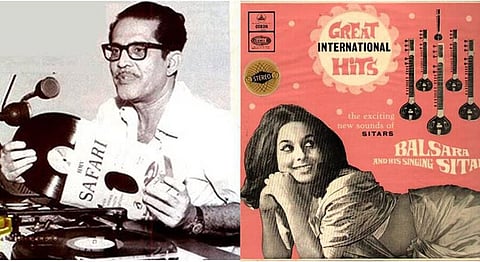
- HOMEGROWN WORLD
- #HGCREATORS
- #HGEXPLORE
- #HGVOICES
- #HGSHOP
- CAREERS
- ABOUT US
- CONTACT US

[On 16th-19th January, 2019, Homegrown is throwing a first-of-its-kind music festival in Mumbai designed to celebrate the city’s vast and diverse music culture. Dive deep into a wide variety of dynamic workshops, exhibitions, curated tours, panels, pop-ups, performances and parties that promise to be inclusive of all kinds of tastes and people.
There’s something for everyone, click here to find what’s perfect for you.]
Vistas Ardeshir Balsara was a legend whose love for music and composition transcended Bollywood films, orchestras, and Bengali movies. His life’s work and the respect he garnered earned him the title of the ‘gentleman musician’. His fingers moved like magic flowing over an array of instruments from the sitar to the piano to the melodica, and his soulful tunes drew inspiration from both western and Indian classical sounds.
As the stalwart instrumentalist once said, “Life is short but art and for that matter, music, is permanent. There is no death of a true art and so it is with music.” Born into a Parsi Zoroastrian family in Mumbai on June 22, 1922, Balsara’s first music teacher was his mother who taught him the harmonium. At the age of six, his first public performance filled the air at C. J. Hall with the melodic tune of a pedal harmonium. A short decade later, he was assisting Music Director Ustad Mustaque Hussain in the production of the film ‘Baadal’, and eventually became a permanent assistant music director at Filmistan studio, working with the likes of Master Ghulam Haider, Khemchand Prakash, Madan Mohan and others.
1943’s Circus Girl was the young music composer’s first independent assignment, and he worked alongside Vasant Kumar Naidu for the film’s music scores. The 40s and 50s saw Balsara’s music featuring in several Hindi films, and in 1947 he joined HMV as an orchestra director. As his clout in the music industry grew, he became the founding secretary of Bombay Cine Musicians’ Association and Bombay Cine Music Directors’ Association.
While Bollywood made up a large part of the instrumentalist and composer’s career, the influence of western music in his classical style could be seen throughout his work. As he once stated in an interview, “I merge pure Indian classical music with the most modern rhythms.” Still, he stopped short of calling his compositions as ‘fusion music’, as he would insist, “In fact, I am allergic to the word fusion.” Hildafield, a German musician, guided him and taught him the ways of the piano.
His musical journey took him to the Bengali film industry when in 1953 Gyan Prakash Ghosh invited Balsara to Kolkata for a music gathering. The city won his heart, and his name found itself attached to Rabindra Sangeet for years to come. Muneshwar Dayal of Gaya served as a major inspiration for his Indian classical music. When he passed away on March 25, 2005, his last Bengali film as a music director ‘Til Theke Taal’ was released the same year, and the music industry lost a legend. As Usha Uthup stated after the gentlemen musician’s passing, “He was the most wonderful person I have ever met and a very talented musician of his time.” The title he earned came from his kind, soft-spoken spirit, because as sitar player Anirban Chatterjee commented, “Apart from music, I loved spending time with him. You could spend hours listening to his views on life.”
In 1969, Balsara released ‘Balsara And His Singing Sitars’ under the World Record Club label, and his sitar covers of the popular Beatles hit ‘I want to hold your hand’ featured on the vinyl amongst ‘These Boots are Made for Walking’ and even ‘Do Re Mi’. ‘Penny Lane’ and ‘Strawberry Fields Forever’ also found themselves in Balsara’s cover repertoire, merging his unique style with the eternal sounds of The Beatles, legends in their own sphere.
Listen to Balsara’s cover of The Beatles in ‘Balsara And His Singing Sitars’ here.
